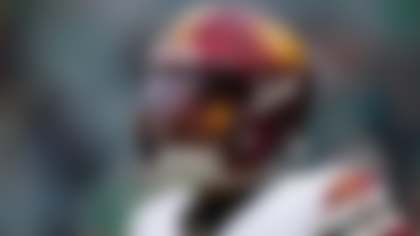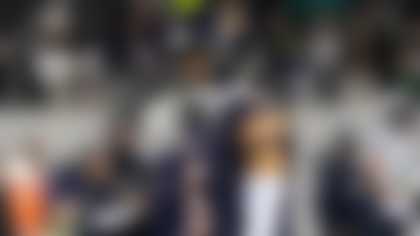ST. LOUIS -- The war room carries a prodigious mystique, fueled by a public faith in the draft's transformative powers and the fact that professional football teams conduct this weighty bit of business shrouded from public scrutiny. And yet, for the most part, the actual machinations that take place in an NFL war room over a three-day period are downright dull -- restrained, orderly, methodical and relentlessly mundane.
On Saturday, near the end of a three-day stretch of businesslike talent-acquisition, some genuine, heart-racing drama arrived unannounced and swept through the war room, spreading quickly across the entire second floor of Rams Park. And for the 40 or so coaches, scouts, front-office executives and other team officials present as history unfolded -- and for a fortunate NFL Media analyst who had the best seat in the house -- the selection of former Missouri star Michael Sam with the 249th overall pick was a unique and exhilarating experience, all of it made possible by one man's distinctive comfort zone.
This out-of-nowhere call by St. Louis Rams coach Jeff Fisher was a real-life plot twist more charged than anything "Draft Day" could have produced on the silver screen, and brought new meaning to the term "The Blind Side."
In the immediate aftermath, there was confusion, followed by a surreal, What the hell just happened? sinking in of the act's significance -- and, eventually, sincere celebration.
There was also something else buzzing through that room: A sort of awed appreciation for Fisher, the magnificently mustached face of the organization, and the man who made the seemingly spontaneous decision to alter both its national perception and its workplace environment without a shred of hesitation or fear.
As Fisher felt the love from virtually everyone in his midst, exchanging fist bumps and accepting congratulations, one of his younger employees put it thusly: "Such a pimp move. It was, Guess what I'm gonna do? Whatever the (expletive) I want. In the world today, it's truly impressive. That's what makes him the best guy to work for, and why so many of us would kill for the guy. It's very simple: Trust The 'Stache. It's big and powerful for a reason."
By the end of the evening, as Fisher sat in his corner office planning a series of team-related activities designed to ensure that Sam will enter a supportive and accepting environment as he attempts to become the NFL's first openly gay player, the legend of The 'Stache had grown to unprecedented proportions.
It's like this: In NFL circles, Johnny Manziel, this draft's most polarizing player other than Sam, is known simply as JFF, an abbreviation paraphrasing the quarterback's "Johnny Football" nickname, with an F-bomb inserted into the middle for emphasis.
At Rams Park on Saturday night, JFF stood for Jeff (Expletive) Fisher.
Confronted with a conundrum that most of his peers preferred to avoid like a "Hard Knocks" camera crew -- or a Tim Tebow practice video -- Fisher welcomed and embraced the opportunity. In the face of numerous reasons not to draft Sam, Fisher got in touch with his inner Jay Cutler, essentially leaning back his head and telling the rest of the football world, *Donnnnnnn't Care.*
"I know exactly what we're getting into, and I'm not worried at all," Fisher said Saturday night as he sipped a glass of sublime red wine while reclining in his large, brown office chair. "Michael Sam will help us, and we'll give him every chance to succeed, and you know what? It's gonna be pretty cool."
Creating cool storylines, of course, is not Fisher's primary mission. He arrived in St. Louis in 2012 -- after a 17-year run with the Titans/Oilers, followed by an involuntary year away from football -- determined to reshape a talent-deficient roster and mold the Rams into contenders. Playing in what has turned out to be the toughest division in football, if not professional sports, Fisher's teams have gone 7-8-1 and 7-9, extending the franchise's streak of non-winning seasons to 10. He understands more than anyone that 2014 is the year St. Louis must make a move.
Fisher's sense of urgency was apparent when, during a Mexican fly-fishing vacation in January, he pulled out his cellphone while standing barefoot on a beach, called his estranged friend Gregg Williams and set up a meeting that led to the once-banished Bountygate villain's unlikely return to Rams Park as defensive coordinator. And it was obvious in the weeks leading up to the draft -- and all the way up through the middle stages of Thursday night's first round, with St. Louis already having selected two of the draft's first 13 players -- as Fisher and many of his closest confidants pondered the possibility of picking Manziel.
By draft's end, having chosen to ride or die with Sam Bradford, Fisher was at peace with the way things had played out. On Thursday, the Rams had muscled up in the trenches, taking the draft's top offensive lineman (Auburn's Greg Robinson) and No. 1 interior defensive lineman (Pitt's Aaron Donald); on Friday and Saturday, St. Louis, among other undertakings, fortified its secondary with some potentially impactful players, most intriguingly second-round nickel corner Lamarcus Joyner and fourth-round safety Mo Alexander.
It was the arrival of Joyner -- and the way the Rams finessed it -- that brought the most pleasure to Fisher and those close to him. Intent on drafting the former Florida State star with the 44th overall pick, Fisher and others in the Rams' war room became convinced that the Titans were preparing to snag Joyner two picks earlier. Rams general manager Les Snead began working the phones, agreeing to a trade with the Bills, who held the selection before Tennessee's, that saw St. Louis give up a fifth-round selection to move up three spots.
When the deal was consummated, and the Rams turned in the card for Joyner, Fisher burst into a huge grin, and there were hoots and hollers of excitement. A few minutes later, when the Titans traded out of the 42nd selection -- a move viewed in the Rams' war room as confirmation that Tennessee had targeted Joyner, only to come up empty -- there was another surge of congratulatory cheers.
"I don't know how we did it," Fisher said afterward, concealing a twinkle in his eye. "I just had a feeling."
The subtext: Things ended poorly for Fisher in Tennessee, where he confronted an inordinate share of obstacles (coaching out of temporary trailers, having an immature quarterback shoved down his throat by a meddlesome owner) while cultivating a cadre of loyal lieutenants like Rams assistant head coach Dave McGinnis.
"Look, we're all in it for him," McGinnis said outside the war room a few minutes after the Joyner pick. "That's it. This is a pretty tight fellowship group. When the Cardinals fired my ass (as head coach, after the 2003 season), he called and said, 'Mac, come work for me. I'll never leave you.' Since that time, I've gotten five or six offers to leave as a (defensive) coordinator, and I've turned them all down. I'm with him till he gets out, or till he decides he doesn't want me anymore.
"He is such a genuine person. Everybody in this building's 'all in' for him. You can feel it."
I felt that same sensation 14 years ago when, in the immediate aftermath of the Music City Miracle -- the trick-play kickoff return that gave the Titans a stunning playoff victory over the Bills, launching a postseason run that ended one yard shy of a potential Super Bowl triumph -- I stood in the kitchen of Fisher's Franklin, Tennessee, home with Alan Lowry, the special-teams coach who engineered the iconic play, and watched him get choked up while describing how his boss had stood up to owner Bud Adams and successfully fought to keep him on the staff.
In an NFL landscape teeming with overbearing taskmasters intent on flexing their power, Fisher manages to exude total control without appearing contrived or insecure. In that sense, he is the ideal coach to handle the media circus -- and the potentially tricky intrasquad dynamics -- that might accompany Sam's presence. Rest assured, Fisher will give and receive respect in equal proportions, will demand it from everyone in his midst, and won't act like a tantrum-throwing tyrant if issues present themselves along the way.
Fisher has a healthy partnership with Snead, the first-time general manager he handpicked after accepting owner Stan Kroenke's offer (and spurning the advances of Dolphins owner Stephen Ross) to coach the Rams, and with Kevin Demoff, the team's chief operating officer. Both front-office executives are forward-thinking and supportive, and each was enthusiastic about bringing Sam into the fold and confronting any challenges that might ensue.
It's also significant that Fisher is secure enough to solicit and consider feedback from employees far lower on the organizational flow chart -- such as 27-year-old scout Brian Heimerdinger, who wrote an extensive report on Manziel and was involved in discussions about possibly drafting the junior JFF. Heimerdinger's father, Mike, who served two stints as Fisher's offensive coordinator in Tennessee and was one of his closest friends, died of cancer in September of 2011. It's clear that Fisher has relished the opportunity to bring "Young 'Dinger," as Fisher calls Brian, into the fold.
Fisher agreed with several coaches and scouts that Manziel has the potential to be a phenomenal quarterback with exceptional competitive qualities. However, the coach remained committed to Bradford (the No. 1 overall pick in the 2010 NFL Draft), who was off to a strong start last season before tearing his ACL in an October defeat to the Carolina Panthers.
At a Wednesday night event for season-ticket holders held at the team's indoor training facility, Snead and Fisher each joined Bradford onstage and pledged allegiance to the quarterback, a clear signal that the Rams would not be drafting Manziel second overall. Shortly after heading home Wednesday night, Fisher laid out his philosophy while sharing his strategy for the first round.
"I've got three hellacious defensive fronts in my division, and I want some big, strong maulers who go right at Seattle and San Francisco's linebackers and let us pound the ball," Fisher explained. "To survive in the NFC West, we have to win in the trenches. That's what this draft is about."
The second overall pick, obtained from Washington as the final prize of the 2012 blockbuster deal that allowed the Redskins to acquire Robert Griffin III, would be used on Robinson -- unless, of course, someone dangled another absurdly rich package of picks to trade into the spot. The caveat: If the Houston Texans somehow decided not to select defensive end Jadeveon Clowney (and didn't trade the pick to a team targeting Clowney), the Rams would pounce on the former South Carolina star as quickly as they could place the call to draft headquarters in New York City.
"I'm gonna go out and get the best (offensive) lineman in the draft," Fisher said. "And then I might go get another at 13."
Notre Dame's Zack Martin was the secondary target, though Fisher and Snead were legitimately worried that each of the three players they liked at that spot -- Martin, Donald and Alabama linebacker C.J. Mosley -- would be off the board. In that scenario, St. Louis would have tried to trade down into the 20s, where they'd be able to land an offensive lineman a bit lower on their board.
Come Thursday night, however, the first round played out swimmingly for St. Louis: All three of those players were there for the taking as the Rams went on the clock for the 13th pick. Fisher settled on Donald, who'll join an already-potent unit that features a pair of talented defensive ends (Chris Long and 2013 All-Pro selection Robert Quinn) and tackle Michael Brockers, picked 14th overall in 2012.
Fisher's faith in that unit -- and, not insignificantly, his belief in veteran defensive line coach Mike Waufle's ability to prod his players to exceptional performance levels -- increased exponentially once Donald was safely in the fold.
"I think people look at our defensive line, specifically last year, as a problem for them," Fisher would tell me later. "Now it's become a bigger problem."
Even after drafting Donald, however, Fisher didn't abandon the dream of further upgrading his offensive line. As two more teams passed on Martin, Snead began working the phones, with the idea of acquiring a third top-20 pick. The parameters of a deal were discussed with the Ravens, who held the 17th pick; the Rams threw out the possibility of surrendering second- and third-round picks, along with next year's second-rounder, should Martin continue to fall.
Watching NFL Network's draft broadcast on the TV in his office, Fisher saw the Dallas Cowboys snag Martin with the 16th pick, rendering the Ravens discussions moot. That led to a follow-up question from a visitor: "Why not trade back in to go get the quarterback? He's still sitting there!"
Over the next half hour, several staffers pitched the idea of trading up for Manziel. Taking him with a third first-round selection, they reasoned, would be less threatening to Bradford, who'd remain the incumbent quarterback for at least 2014. Also, as one person put it to Fisher: "This isn't the Johnny Manziel of two hours ago. It's a guy who's mad at the world because he keeps getting passed over, and wants to take it out on everyone."
The challenge, in Fisher's eyes, was to upgrade the roster around Bradford. Having traded up in last year's first round for diminutive speedster Tavon Austin, one year after selecting Brian Quick with the first pick of the second round, he was averse to spending one of his first-round selections on another wideout (such as Clemson's Sammy Watkins). He did use his third-round selection on a running back, Tre Mason -- albeit one who is highly unlikely to crack the starting lineup, with two second-year players, Zac Stacy and Benny Cunningham, expected to receive the bulk of the work.
Late Friday night, shortly before leaving his office for the night, Fisher met with Snead and Demoff to map out the following day's strategy. After laying out several options for the fourth-round pick, Fisher locked in on Alexander, a St. Louis native with a remarkable story: Forced to withdraw from Utah State for the 2012 campaign after a bar fight in which he punched an Aggies teammate -- and was subsequently sued by the player's family, leading to his season-long suspension -- Alexander supported himself by working as a janitor at the Edward Jones Dome, sometimes cleaning up after Rams home games.
He returned to Utah State for the 2013 season, switched from linebacker to safety and, as the scouting process played out, became an under-the-radar obsession of sorts for Fisher.
"If I don't get him," he told Demoff and Snead on Friday night, "I'm gonna be mad."
"How mad?" Demoff asked.
"Like, Bobby Wagner mad."
Ouch -- the reference to Wagner, another ex-Utah State defender, evoked an unpleasant memory from the 2012 draft: Rather than picking Wagner, the middle linebacker he coveted with the 45th overall selection, Fisher got greedy, trading down five spots to pick up a fifth-round pick from the Chicago Bears. Two selections later, the Seahawks took Wagner, who would become an instant standout and, in his second season, serve as the defensive signal-caller for their Super Bowl-winning team. The Rams (who still could have drafted future Tampa Bay Buccaneers star linebacker Lavonte David, for what it's worth) instead took running back Isaiah Pead, a major disappointment who probably will have to fight for his roster spot this summer.
"If you want him that much," Demoff advised Fisher, "just take him in the fourth round, even if you think he might be around later. It's not worth messing around."
Before Demoff and Snead departed, the subject of Sam came up, but there wasn't a lot of serious discussion: Viewed as a "tweener" who doesn't necessarily fit their 4-3 scheme, Sam wasn't high on the Rams' draft board, and it was assumed he'd be gone by the time the team made its four picks in the seventh round, which was about where they had him rated.
Fisher didn't get much sleep Friday night, what with the early start (11 a.m. Central time) to Saturday's proceedings. He was quiet and restrained until, to the coach's delight, Alexander was there for the taking when the Rams went on the clock in the fourth round.
Perhaps the happiest person in the building as the pick was made: Fisher's assistant secondary coach and eldest son, Brandon, who spilled out into the hallway outside the war room and said, "This kid's biggest problem was he practiced so hard, he kept injuring his teammates. Seriously. They had to pull him back. I can't wait to coach him."
Williams, one of the NFL's most aggressive defensive coordinators, excitedly joined the conversation. "The last guy I had like that was Sean Taylor," Williams said, referring to the late Pro Bowl safety he coached as the Redskins' defensive coordinator from 2004-07. "He would go out and try to jack up Santana Moss and our other receivers. He didn't know any other way, other than trying to show, I'm better than you, all the time."
While Williams' surprising return to the Rams was a highly popular move among Fisher's assistants, it was also a bit awkward. The background: After a highly successful stint as Fisher's defensive coordinator in Tennessee from 1997-2000, Williams left to become head coach of the Buffalo Bills, and the two men remained close friends and confidants. When Fisher took the Rams job, he hired Williams as his defensive coordinator, a reunion that excited both men.
Two months later, however, Williams was suspended indefinitely by NFL Commissioner Roger Goodell for his role in the New Orleans Saints' pay-for-injure scandal, shortly before an audiotape surfaced of Williams exhorting Saints players to inflict physical punishment on their opponents before a 2011 playoff game with the San Francisco 49ers. Suddenly, Williams was castigated as a symbol of all that was wrong with football, and Fisher had to move on without his friend, barred from even communicating with him during the suspension by the commissioner's decree.
'ATL Podcast'

The Around The League team hits all the NFL's hottest topics in its award-winning podcast. Join the conversation. **Listen**
With Williams out of the mix, Fisher went without a defensive coordinator in 2012, delegating many of the coordinator's responsibilities to his young linebackers coach: Williams' son, Blake. Though considered brilliant by his fellow coaches, Blake Williams alienated many of them -- and several Rams players -- on an interpersonal level, and Fisher fired him after the season. Fisher also officially parted ways with Gregg Williams upon his reinstatement by Goodell, instead hiring former Detroit Lions defensive backs coach Tim Walton as the Rams' defensive coordinator for 2013 (after Rob Ryan served briefly in that role, only to bolt for the Saints in semi-comical fashion, leaving abruptly one morning and racing across the street to a McDonald's, never to return, with Fisher figuratively feeling a kinship to the "Billions and Billions Served").
Fisher and Gregg Williams, who spent the 2013 season as a senior defensive assistant for the Titans, went more than a year without speaking, and it appeared that their relationship was severed permanently. Fisher's ice-breaking phone call from Mexico, however, led to several heart-to-heart discussions, and he enthusiastically welcomed Williams back into the fold. For now, at least, it's all kumbaya, largely because both men believe in the power of the partnership.
Having a bona fide star as a coordinator is a luxury for Fisher, allowing him to delegate one of his many responsibilities. He is immersed in all facets of the Rams' football operations, from evaluating pro and college personnel to setting the daily schedule, and sometimes, even The 'Stache is overtaxed. On Saturday, for instance, shortly before using a sixth-round pick on a developmental quarterback (SMU's Garrett Gilbert, after having considered trading up to grab Alabama's AJ McCarron one round earlier), Fisher was informed that a clip of a couple having sex had been posted to recently signed receiver Kenny Britt's Instagram account.
"Seriously?" was Fisher's exasperated reaction.
Britt, a former Titans standout whose career has been derailed by injury and off-the-field incidents, is attempting to resurrect himself professionally under the tutelage of the coach with whom he enjoyed his greatest success. Needless to say, Fisher was not thrilled to learn of the most recent development, especially with the Rams only a few minutes away from being on the clock.
"Can you take care of this, please?" Fisher asked in a frazzled tone, delegating the assignment to the Rams' player programs and security department.
Britt, undoubtedly, expected the worst: On Day 3 of the draft, this ranked as a legitimate headline, and headache. Little did he know -- hell, little did anyone at Rams Park know -- that Fisher was about to render him a mere footnote to history.
With four remaining picks, all in the seventh round, the Rams had a chance to fill out their roster with some imperfect but intriguing prospects. It's a time when talent evaluators are prone to taking chances, and they're also looking for value.
Sam, Fisher knew, was just looking for a chance to make somebody's team -- the same way Fisher, a former USC safety, felt before the Chicago Bears took him in the seventh round of the 1981 NFL Draft. Certainly, the Rams could have given Sam a shot as an undrafted free agent, but the coach also understood the symbolism that a formal selection would carry, and he decided St. Louis was the perfect place to provide a safe haven for the former Missouri star.
He broached the idea with Snead and Demoff, then left to place a call to Kroenke, who was fully supportive. ("I trust you guys," he told Fisher. "Go for it.") Back in the war room, with the Rams holding consecutive compensatory picks near the bottom of the draft -- selections 249 and 250 out of 256 -- Fisher had a brief phone conversation with Tennessee State center Demetrius Rhaney (on whom he'd use the 250th pick, destined to be noticed by virtually no one in America outside of Rhaney's household). Then Fisher got on the phone with Sam, who started bawling, and there was no turning back.
At 5:48 p.m., the Rams officially selected Sam, and the war room scene turned surreal. The 'Stache soaked it all in, thoroughly enjoying the experience. He got excited when informed by Artis Twyman, the team's senior director of communications, that the Rams were the franchise which 68 years earlier signed the first African-American player of the NFL's modern era, UCLA product Kenny Washington.
"That's pretty cool," Fisher said, before heading downstairs to meet the media.
Certainly, Fisher understood and embraced the social significance of what he had done. In the end, however, football is what drives JFF, and as he sat in his office Saturday night, picking at a plate of Chinese food with a pair of wooden chopsticks and sipping his glass of wine, he spoke of Sam's potential impact as a pass rusher on a team full of athletic men who do it well.
"I know he's up against a big challenge," Fisher said as Brandon and Young 'Dinger nodded in unison. "On paper, we don't really need him. But you know what? Mike Waufle will coach him up, and he'll figure out a way to maximize his particular skill set. And Gregg's a mad scientist, and he'll come up with a scheme that suits his talents. I can see it now, during the preseason. Gregg will be on the sidelines yelling, 'Sam! Sam! Sam!' We'll have a package, and we'll roll it out, and he'll get after it."
And for a few practice games -- and perhaps a whole lot of real ones -- Sam will be a Ram, and Fisher will have a vested interest in the young man's football future. It's not what anyone at Rams Park other than the head coach had in mind until about 5:30 p.m. on Saturday, but now it's happening, and the momentum behind it is unmistakable.
Perhaps, in retrospect, we should have seen this coming -- for it's very simple, and it can be summed up in three words: Trust The 'Stache.
Follow Michael Silver on Twitter @MikeSilver.




